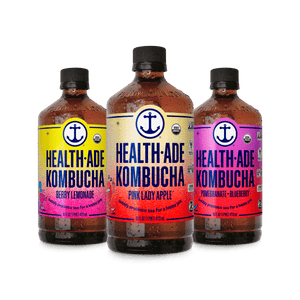
Kombucha | 12 Pack
Fan Favorite Variety Pack
One-time Purchase
49.95

Copied URL to clipboard!
As you settle into the rest of cozy season, it’s important to be aware of some of the potential impacts the winter months can have on your health. Colder temperatures, shorter days, and drier air can all change how you feel, both physically and mentally.
Here at Health-Ade, you know we’re all about helping you follow your gut (and take care of it, too)! If you’ve been wondering, “can the change in season have a negative impact on my gut health?”, we’re here with answers and a few practical tips to help you keep your gut out of a winter rut.
The short answer is yes; winter can pose some challenges to your gut health. The seasonal changes that come along with this time of year can pave the way for several behavior shifts, including:
While these behavior changes make sense and can often add more enjoyment to this time of year, they can also have negative impacts on your gut when left totally unchecked. It might be a bit more challenging to prioritize your gut health this time of year, but that doesn’t mean it has to take a total backseat. Here are a few suggestions to help you find some balance between these seasonal changes and gut-supporting behaviors!
You may struggle to include fiber-containing foods this time of year if you’re only thinking about raw fruits and veggies. These can be super crisp and refreshing in the warmer months, but they’re without a doubt less appealing in the winter. Consider exploring some roasted root veggies like sweet potatoes, turnips, parsnips, beets, and carrots, for a winter fiber fix. You can even top these with balsamic glaze or crumbled goat cheese for an added burst of tangy flavor. Ever tried cooking apples, pears, or making a simple berry compote? These are great toppings for a warm bowl of oatmeal! All these foods are sources of fermentable fibers that act as fuel for the good bacteria in your gut.
‘Tis the season to keep some fermented foods and beverages in your weekly rotation, too! Try topping a warm rice bowl with kimchi, using pie leftovers as a crumble on top of a yogurt parfait, or crack open a bottle of our seasonal Ginger Spice & Everything Nice (formerly Holiday Cheers) kombucha for a bubbly, probiotic beverage.
Exposure to UV rays from the sun helps your body produce vitamin D. You may know of vitamin D’s importance in bone health, but did you know it also plays a role in strengthening your immune system and protecting your gut barrier? (1).
Even though you won’t get as much UV exposure outside in the winter as you do in the summer, it’s still a good idea to get outside when you can for several minutes of fresh air. To make up for the rest of your vitamin D needs, think about including sources of fatty fish like salmon and tuna, whole eggs, and beverages fortified with vitamin D. You can also talk with your doctor about a supplement if your vitamin D levels are consistently low.
In addition to getting some sunlight, heading outside can also encourage you to find quick bouts of feel-good movement. Regular movement promotes smoother digestion, decreases gut transit time, and helps stabilize blood sugars. If the outdoor temperatures are too cold to bear, try to test out some indoor movement options like stretching, yoga, or an online strength training class.
Staying hydrated this time of year can be tough because you may not experience the same level of thirst cues that you do in the warmer spring and summer months. Regardless, staying on top of your fluid intake is essential to your gut function and overall energy levels.
To meet your fluid needs throughout the day, choose water most often. Remember that other liquids like milk, coffee, juice, tea, (and kombucha!) also count towards your overall fluid intake. It’s totally fine if you feel more drawn to beverages like coffee this time of year to keep you warm or give you a quick energy boost but do keep in mind that too much caffeine can lead to GI upset.
If you’re looking for a gut-happy midday energy and hydration boost, grab a bottle of kombucha! Every bottle of Health-Ade has less caffeine than a cup of decaf coffee, it counts towards your fluid intake and has living probiotics to support your gut. It’s also a great mocktail base if you’re looking to cut back on alcohol (another known microbiome disruptor) this holiday season.
No matter what your holiday season has in store, we hope that you can find ways to nourish, fuel, and care for yourself. Until next year, happy holidays!